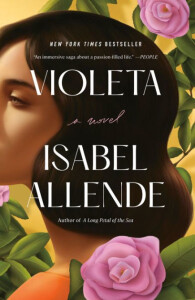
I haven’t read all of Allende’s novels, but I’ve read a few and enjoyed most of them, so I was glad when my book club chose her most recent (2022) novel. It is the story of a life, written as a letter from Violeta, now 100 years old, to Camilo, whose identity only becomes clear as we get fairly far into the book.
She begins with her birth in 1920, the year when the influenza pandemic which began in 1918 in the battlefields of the Great War finally finds its way to her unnamed South American country. Reaching the end of her life as the COVID pandemic takes hold provides a neat framework for a story whose characters try to determine their own fate, especially the strong-willed Violeta, but are often stymied by world events.
The beginning is full of warm humor, like the best Allende novels. Violeta is born after a raft of boy children—we never learn all their names and even their mother can never remember their ages. Her mother “loved her sons, in theory, but in practice she preferred to keep them at a comfortable distance” and “felt doomed to bear only sons, like a curse from the Devil.” So she doesn’t believe her sister when she says the baby is a girl.
Then there’s is the English governess imported to tame the spoiled little girl, who turns out to be anything but the matronly, old-fashioned woman they expected. Miss Taylor is Irish and only in her twenties, dressed in the latest English fashion and wearing makeup, who soon meets a local woman who recruits her to the Suffragette cause.
However, events move quickly—we do have 100 years to get through—and some things get dropped, such as the maternal grandmother who sits silently in the conservatory and is never mentioned again, though she has somehow disappeared a few pages later. There were incidents that I wanted to hear more about, but they are briefly narrated along with everything else.
I think the narration—pure exposition with almost nothing in the way of dramatic scenes—is the main reason the people in my book club began to lose interest in the book after the beginning. For me, an additional reason was that it all began to sound very familiar.
I’d recently read Allende’s memoir Paula, a letter written to her comatose daughter as Allende sat by Paula’s bedside. I thought it would be about Paula, but it is Allende’s life along with her memories of her parents and grandparents. It is also narrated and covering the same period, the same events as this book. Harder to read, though, because the paragraphs go on for pages, unbroken.
Similarly, Violeta was started in response to the death of Allende’s mother at the beginning of the COVID pandemic. The two had exchanged letters daily whenever they were apart throughout Allende’s life. The author has said in interviews that her characters start with a real person whom she then modifies to become the character for a story, adding a dollop of herself as good writers do. Having read the memoir, though, it seems to me that, while this book supposedly is based on her mother’s life, it is much more about Allende’s. Hence my feeling that I’d already read this book.
One thing I found interesting about it is that, instead of following a traditional (in Western literature) story structure of action in pursuit of a goal that rises to a climax, Allende employs an episodic structure. The most famous example of that kind of structure is Don Quixote, but the difference is that Cervantes’s novel has an overarching theme, where this one does not seem to have one. Nothing ties the episodes together except that they are all part of Violeta’s life. I may be missing something.
Each episode is narrated—told, not shown—sometimes engaging and sometimes not. One person read aloud part of a section dealing with a political event that, as she put it, sounded like something out of a political pamphlet. We also felt that the references to it being a letter to Camilo felt like they’d been dropped in here and there after the book was finished, rather than being an organic part of the story.
Some people didn’t finish the book; others did and enjoyed it but, as one person said, forgot it as soon as she turned the last page. We agreed, though, that based on our love of other books by Allende, we would be willing to read her work.
Do you have a favorite novel by Isabel Allende that you would recommend?